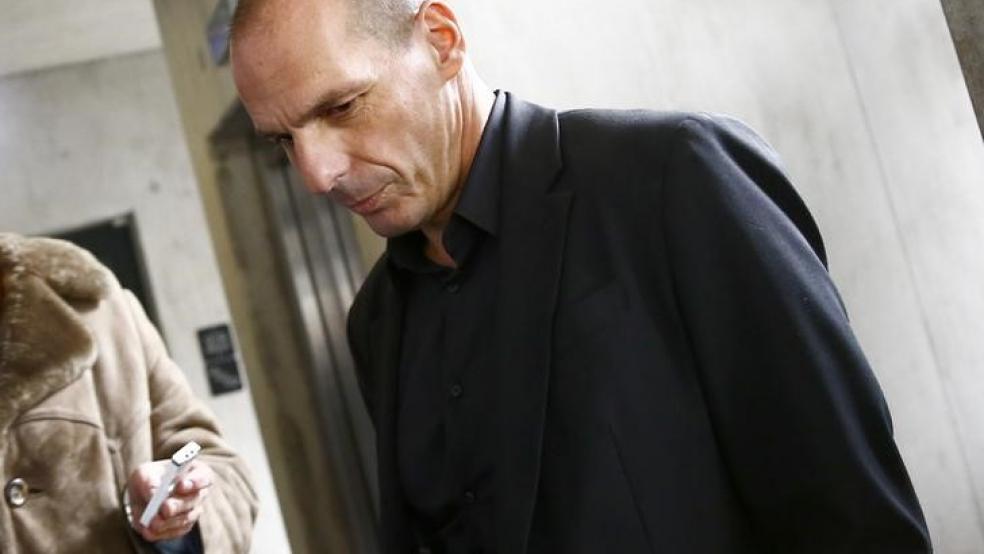ATHENS (Reuters) - Greece expects to make a clean break with official lenders when its international bailout expires in August and has no reason to seek a precautionary credit line, its finance minister has told Reuters.
Instead, Euclid Tsakalotos said in an interview, the country is building up its own protective buffer that, along with unused European bailout funds, will cover Greece "for well over a year", if needed.In coming months, he said, the country would be preparing its own post-bailout plan with an emphasis on reforms, social policies and growth.He also said discussions would soon commence with euro zone lenders on debt relief along the lines of a French proposal to link the level of debt restructuring to economic performance. "We feel we have built credibility over the last three years," Tsakalotos said.Greece is close to emerging from a sovereign debt crisis that plunged the economy into its biggest depression in decades, threatening to rupture the euro zone. It has received a record 260 billion euros in repeated bailouts since 2010.The leftist-led government of Alexis Tsipras has vowed to end the humiliation of austerity imposed on Greece by its international lenders, but the nation still has a debt burden of 178 percent of economic output and some European policymakers believe Athens cannot go it alone without debt relief and a standby line of credit.A precautionary credit line, though, would come with yet more conditions attached, so Athens is proposing its own plan. It is also creating a safety net of up to 19 billion euros drawn from leftover, unused bailout funds and from bond issues. Post-program surveillance schemes were common to other European member states which sought financial aid, Tsakalotos said. But Greece's own post-bailout plan would be more pro-active.It would, he said, show lenders and the markets that Greece had ownership over its own program of future reforms and growth strategies, rather than Brussels. "We are thinking, by Easter, of preparing our own plan .. to show both the institutions but also the markets that it is our program, it has ownership... it hasn't been imposed, it's not a matter of compromise," he said. NO PRECAUTIONARY LINE NEEDEDTsipras' left-led coalition shocked markets and its lenders when it was catapulted to power in 2015 promising to reverse reforms and tear up the country's bailouts. But it was later forced to cave into lenders' demands for more austerity under a new rescue package. That 86-billion euro loan package ends in August.Tsakalotos said that the economy was turning a corner and the country was ready to stand on its own feet soon. "We've been outperforming our fiscal targets, the economy is returning," he said. "To those people who think we need something more, like a precautionary credit line or whatever, they are just pushing the key question back and I don't see any reason for that," Tsakalotos said.The International Monetary Fund has not yet decided if it will participate in Greece's latest bailout program, having repeatedly voiced concern at the sustainability of the country's debt pile. "I think their inclination and their strategy is to get a deal that makes the Greek debt sustainable so they can come on board," he said.Athens last week concluded a review of its bailout progress and has yet to undergo a final check before its program ends. It hopes to start talks on medium-term debt relief soon, mindful of ballooning debt because of this aid, and now hopes to start talks on medium-term debt relief measures. Greece and its lenders are expected to flesh out a French proposed mechanism which was presented in June and will link debt relief to Greece's growth rates. The economy is expected to grow by up to 2.5 percent this year and in 2019. "What we will be going over the next month or so is working out the nitty-gritty of it, the mechanism, how it will kick in, when it will kick in," Tsakalotos said adding that a kind of subcommittee of the Euro working group would handle this. Details on the cash buffer, the growth mechanism along with the implementation of the measures agreed in June would give investors clarity over Greece's trajectory, he said.Greece returned to bond markets in July after three years of market isolation. Another issue would follow "soon", he said."The only outstanding issue is the composition of that buffer, how much will come from Greece's own funds, and how much will come from the ESM and I'm looking forward to that debate." TOXIC LOANS Greek banks are saddled with about 100 billion euros in bad loans (NPLs), after a seven-year depression that cut economic output by a quarter and pushed more than a fifth of the population into unemployment.The results of stress tests on the banks by euro zone supervisors are expected in May. "We shall see what the results of the stress tests are," said Tsakalotos. "I think that a lot of people would want to give banks a chance to see all these bits of the puzzle that we put in to work through, and to address the NPL problem." "The good thing is that it's going to have the same criteria across the European banking system, it's not like it's picking Greece as an exceptional case." He pondered at a question on the government's achievements. It was, he said, a mixed picture but the foundations for a sustainable economic recovery had been laid."There are the pillars there, and it will be up to our government and if we are elected again, to see whether we can build on that," he said, referring to elections in 2019."... The difference between a happy ending and a sad ending is where you cut the film, yes? We are still on the film." (Reporting by Renee Maltezou and Michele Kambas Editing by Jeremy Gaunt)Greece wants clean break from lenders, preparing own post-bailout plan: finance minister

COSTAS BALTAS



